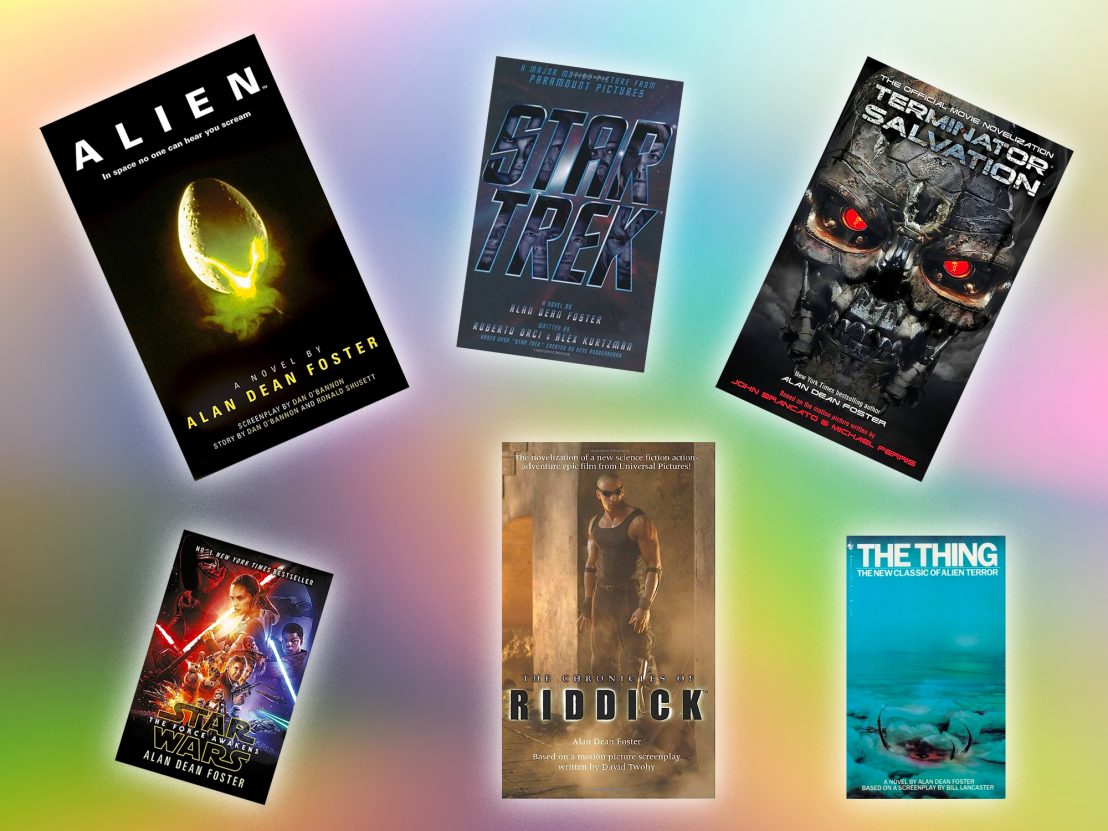
Alan Dean Foster, who has adapted the likes of Alien and Star Wars for the page, explains the highly specific art of transforming sci-fi epics into page-turners.
Arizona-based author Alan Dean Foster has been turning movies into novels since the early 70s. Today, he has an extensive portfolio of film novelizations under his belt, including major titles such as Star Trek, Star Wars, Alien, Clash of the Titans and Transformers. Foster spoke to Little White Lies about the business of film novelization, which involves everything from collaborating with demanding studios to elaborating upon screenplays without straying too far from the on-screen narrative.
LWL: What was the first movie novelization you worked on?
Alan Dean Foster: Del Rey Books asked me to make a book out of Luana, the Girl Tarzan (1968). They had the rights to the film, but no script, so they set up a screening for me. The problem was the film was in Italian with no subtitles. I was sitting there thinking, “What can I do with this?” Luckily, Frank Frazetta, the man who transformed fantasy painting and illustration in the mid-to-late twentieth century, was hired to do two paintings to advertise the film, which were going to be used for the book covers. I essentially nominalized Frazetta’s paintings, which are very dynamic and action-packed, and I wrote my own female Tarzan story. After the book came out, somebody from Disney contacted Del Rey Books and wanted to know whether the film rights were available, but it was a little late!
What sort of material do you like to have before you start working on a movie novelization?
Film stills are great, but if not, then even just having headshots of the principal performers helps me to describe the characters. I don’t have to see film stills or the film itself to write a novelization, though. Before the internet, that was impossible, anyway.
When I did the novelization of Alien, I got the screenplay and some stills in the mail, but there was no picture of the alien itself. I called the studio and the person at Fox said, “We’re actually not letting out any pictures of the alien.” So, if you read the book version of Alien, there is no description of the alien — just a lot of adjectives. I ended up doing the book versions of four of the five Alien films, and after the first film, everybody knew what the alien looked like, so it became easier.
How does the process of writing your own work of fiction differ from writing a film novelization?
It’s much easier to write a novelization because the plot and the characters are all there. I just need to elaborate. With an original novel, I tend to disappear into myself a bit more than with a novelization because there’s nothing there unless I make it come into existence.
Do film novelizations tend to come out at the same time as the film?
Usually, the studio wants the book to come out at the same time as the film. There are exceptions, though — Star Wars probably being the most notable. The book came out many months before the film was released to build interest in the story.

When the novelization is written before or during the production of the film, does that lead to more challenges for you?
It can do, yes. When Terminator Salvation was in production, for example, they kept on making major changes, and the publisher asked me to incorporate the new material into the manuscript. When the book was accepted, I got a note back asking me to add a few more last-minute changes because the film had changed massively again, so over one weekend, I rewrote the whole book.
How closely do you collaborate with the directors and producers when you are writing a novelization of a film?
The people making the film have no time to look at a novelization, and that’s great. When the producers decide to get involved with the novelization, it generally messes things up. The studio has the right of refusal, but once they have approved it, then the work is between the editor, the publisher and the writer.
How far do you tend to stray from the source material that you’re provided with?
I always respect the original work of the screenwriters, even if I don’t think it’s necessarily Gone with the Wind. I have to do more character development, but that’s one of the challenges and pleasures of doing a novelization. I go inside the characters’ heads, and I can also greatly expand upon minor characters. This is one way of turning a screenplay into a full-length novel. If you just change the screenplay to prose format, then you’ll end up with a 100-page book, which won’t work.
When I got the screenplay for Star Wars: The Force Awakens, I thought there was more than just a casual frisson between the characters of Rey and Finn. I developed that in the book as much as I was allowed to, and then I had to cut it back to a certain extent. Real fans jump on this stuff right away. I essentially get to make my own director’s cut, and generally the studios and the editor will leave me alone.
Have you noticed any shifts in the industry since you first started doing film novelizations?
A lot of science-fiction films have become important franchises. If you’re contracted to write the novelization of a Star Wars film or to do a spin-off in that universe, the studio now gets involved. In the beginning, there was just George Lucas. I’d just write the book, turn it in and that was that.
Nowadays, there’s a committee that reviews everything from characters on McDonald’s cups to film novelizations, spin-off novels or comic books. It’s done for consistency in their universe, because if you get somebody’s belt buckle wrong in the book, there’ll be somebody out there telling you it should have been blue instead of green.
Published 3 Jul 2023

For rope access and rigging expert Ollie Laker, filming high above the trees is just another day at the office.

David J. Peterson, who has worked on Game of Thrones and Dune, reveals the secrets behind creating the languages which bring fantasy worlds to life.

The head of the hair department on Damien Chazelle's Babylon explains how the team defied convention in order to create a fresh vision of the roaring twenties.